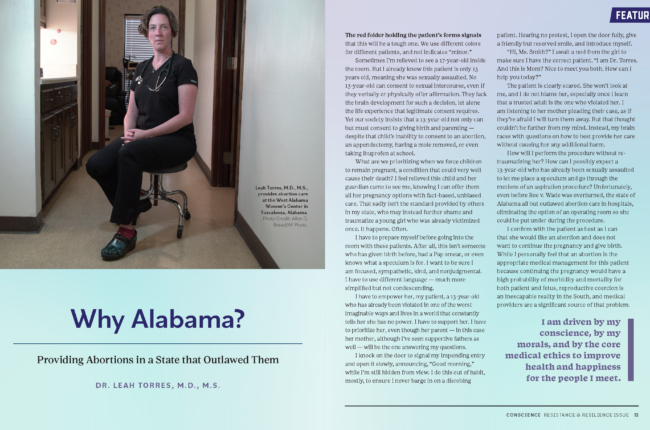Why Alabama? Providing Abortions in a State that Outlawed Them

Leah Torres, M.D., M.S., provides abortion care at the West Alabama Women’s Center in Tuscaloosa, Alabama.
The red folder holding the patient’s forms signals that this will be a tough one. We use different colors for different patients, and red indicates “minor.”
Sometimes I’m relieved to see a 17-year-old inside the room. But I already know this patient is only 13 years old, meaning she was sexually assaulted. No 13-year-old can consent to sexual intercourse, even if they verbally or physically offer affirmation. They lack the brain development for such a decision, let alone the life experience that legitimate consent requires. Yet our society insists that a 13-year-old not only can but must consent to giving birth and parenting — despite that child’s inability to consent to an abortion, an appendectomy, having a mole removed, or even taking ibuprofen at school.
What are we prioritizing when we force children to remain pregnant, a condition that could very well cause their death? I feel relieved this child and her guardian came to see me, knowing I can offer them all her pregnancy options with fact-based, unbiased care. That sadly isn’t the standard provided by others in my state, who may instead further shame and traumatize a young girl who was already victimized once. It happens. Often.
I have to prepare myself before going into the room with these patients. After all, this isn’t someone who has given birth before, had a Pap smear, or even knows what a speculum is for. I want to be sure I am focused, sympathetic, kind, and nonjudgmental. I have to use different language — much more simplified but not condescending.
I have to empower her, my patient, a 13-year-old who has already been violated in one of the worst imaginable ways and lives in a world that constantly tells her she has no power. I have to support her. I have to prioritize her, even though her parent — in this case her mother, although I’ve seen supportive fathers as well — will be the one answering my questions.
I knock on the door to signal my impending entry and open it slowly, announcing, “Good morning,” while I’m still hidden from view. I do this out of habit, mostly, to ensure I never barge in on a disrobing patient. Hearing no protest, I open the door fully, give a friendly but reserved smile, and introduce myself.
“Hi, Ms. Smith?” I await a nod from the girl to make sure I have the correct patient. “I am Dr. Torres. And this is Mom? Nice to meet you both. How can I help you today?”
The patient is clearly scared. She won’t look at me, and I do not blame her, especially once I learn that a trusted adult is the one who violated her. I am listening to her mother pleading their case, as if they’re afraid I will turn them away. But that thought couldn’t be further from my mind. Instead, my brain races with questions on how to best provide her care without causing her any additional harm.
How will I perform the procedure without re-traumatizing her? How can I possibly expect a 13-year-old who has already been sexually assaulted to let me place a speculum and go through the motions of an aspiration procedure? Unfortunately, even before Roe v. Wade was overturned, the state of Alabama all but outlawed abortion care in hospitals, eliminating the option of an operating room so she could be put under during the procedure.
I confirm with the patient as best as I can that she would like an abortion and does not want to continue the pregnancy and give birth. While I personally feel that an abortion is the appropriate medical management for this patient because continuing the pregnancy would have a high probability of morbidity and mortality for both patient and fetus, reproductive coercion is an inescapable reality in the South, and medical providers are a significant source of that problem.
As a physician, I cannot permit my personal feelings to override the medical decision-making of my patients. To allow my beliefs to drive their care would violate all four principles of medical ethics as outlined by the American Medical Association: beneficence, non-maleficence, justice, and autonomy.
I offer her the choice of a medication abortion: swallow one pill called mifepristone that will stop the development of the pregnancy by blocking progesterone receptors, followed the day after by four pills of misoprostol dissolved in the cheeks for 30 minutes then swallowed to help the uterus contract and the cervix to open slightly to expel the pregnancy.
This is the medical management given to someone terminating a pregnancy or experiencing a miscarriage. However, the patient’s mother did not want to risk the less than 5% failure rate of medication, and the patient agreed she would prefer the aspiration procedure to be absolutely positive the process was complete. I couldn’t blame them. I might have done the same myself, though one never really knows how they would feel until they’re in this situation.
Unfortunately, as my clinic can’t do heavy sedation, providing her with the most optimal care means sending her away. I excuse myself, explaining that I need to coordinate an aspiration procedure in an operating room under anesthesia.
It is no simple task.
First, I contact my friend and colleague at a nearby university to see if she would be the accepting surgeon. She would. Of course she would. But she explains she needs permission from her department to provide the procedure, even though it is within Alabama’s laws and regulations. The “must ask permission to provide legal, evidence-based care” bureaucracy is as common as oxygen here.
Her department tells her no. They do not give her a reason for their refusal — they simply say no. No, this 13-year-old sexual assault survivor will not be allowed a lifesaving procedure in an operating room; instead she must be re-traumatized.
I call the head of the department for an explanation. “We don’t have the staff for it,” he claims. I press on. “You don’t have the staff for a standard D&C?”
He clarifies that they don’t have enough staff because no one is willing to assist on the procedure. He assures me, however, that he and his staff are “very compassionate,” despite the fact that they are now forcing this 13-year-old to be re-traumatized.
The next option is to transfer her to a clinic that offers moderate sedation, and that is where she goes, though it is farther away than the university, making the entire tragic situation more complex. I wish I could say this situation was unusual, but that would be untrue. I wish I could say that for the most part I have encountered compassionate, patient-centered healthcare providers, but that also would be untrue.
I can count on one hand the number of healthcare providers I trust in this state. I need all my fingers and toes and more to count the number of instances our healthcare system harmed a patient in the 1.5 years I have practiced in Alabama.
Before living in Alabama, my life experiences taught me that the field of obstetrics and gynecology is riddled with oppressive misogyny and racism that harm one of the most vulnerable groups in our society: women, especially pregnancy-capable people. Before abortion became a Class A felony in Alabama, I wrote about how bad things already were.
Since abortion has become illegal, I have seen more neglect in the healthcare system: I have provided prenatal care for people desperate to ensure their pregnancy’s health after their regular clinic denied them an appointment for owing a nominal balance.
I have also provided care to people whom the system blocked from receiving basic preventive care. For example, I’ve seen people with dangerously high blood pressure who couldn’t get an appointment at their usual clinic for weeks. These patients are essentially told, “Sorry, go to the emergency room, where you will be billed thousands of dollars you can’t afford because Medicaid isn’t expanded.”
These folks are poor enough that they can’t afford private health insurance but not poor enough to qualify for Medicaid. So they’re uninsured. I start them on blood pressure medicine and follow them until they can obtain their primary healthcare provider appointment. I am honored to help people in this way. Who knows how bad their stroke or seizure might have been after waiting four weeks for care.
Again, I wish these examples were anomalies, but they are not, and there is no article I can write that would do justice to the list of things that need to change in our healthcare system.
People often ask me why I am in Alabama “of all places.” To be fair, they asked me the same question when I was in Utah or rural New Mexico. The answer is always the same: I go where I am needed. Never have I felt more needed than here in Alabama. The racism and misogyny are on levels I have never encountered before, and I must do what I can to ensure everyone has access to evidence-based, nonjudgmental, compassionate healthcare.
This state has twice the national average of people dying in pregnancy and birth, 1 in 5 children do not know when their next meal will be, and some of the worst statistics on chronic health conditions come out of Alabama. Black people, LGBTQIA+ people, and Indigenous people are all at risk merely by existing in this state.
Whatever I can do to help people, I will do. That is the oath I took and that is the creed I live by. I hope our clinic can remain open, but we are struggling. I am driven by my conscience, by my morals, and by the core medical ethics to improve health and happiness for the people I meet. After all, they are real people with real lives and real friends and family who care about them. I care, too.



